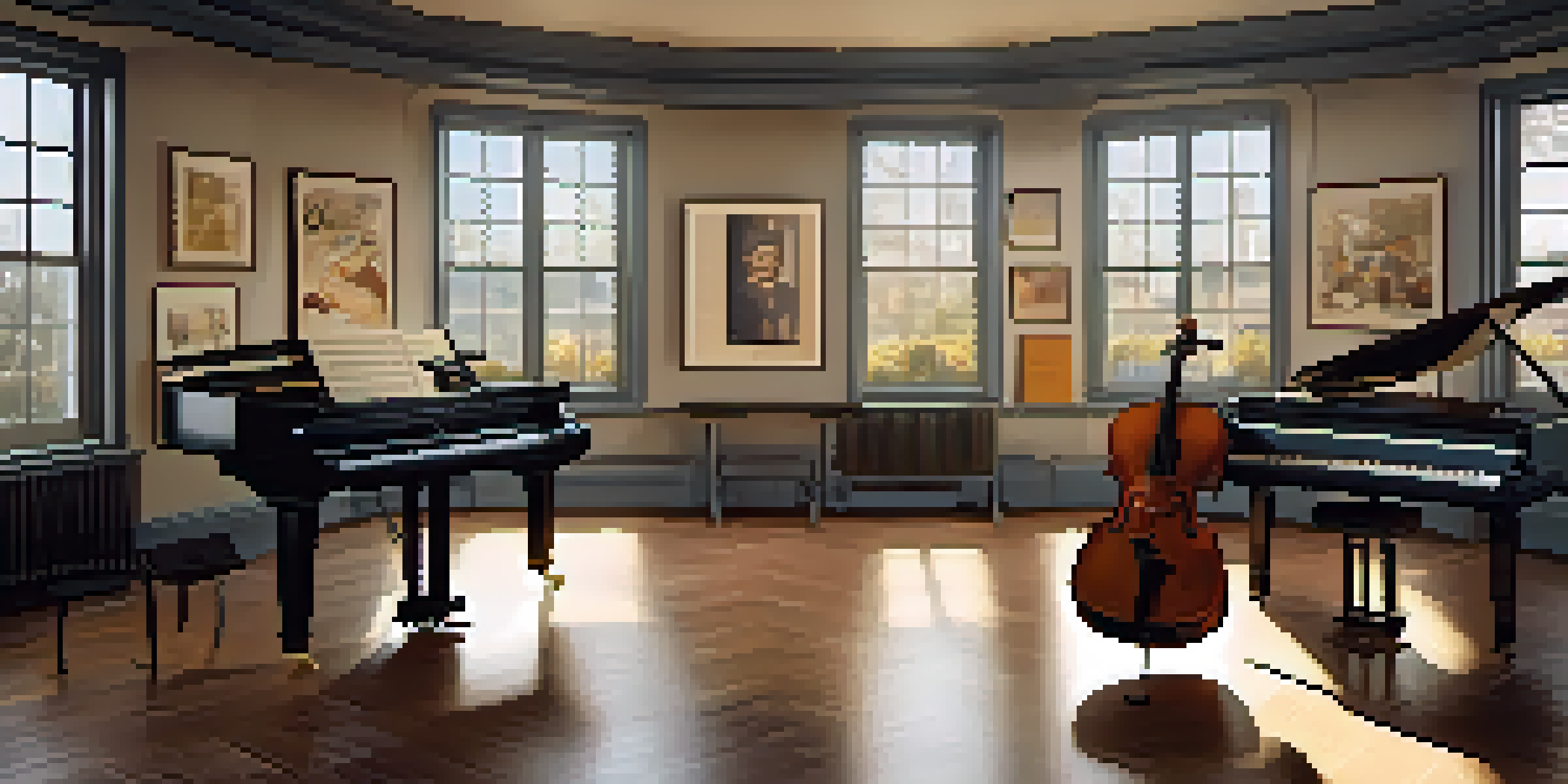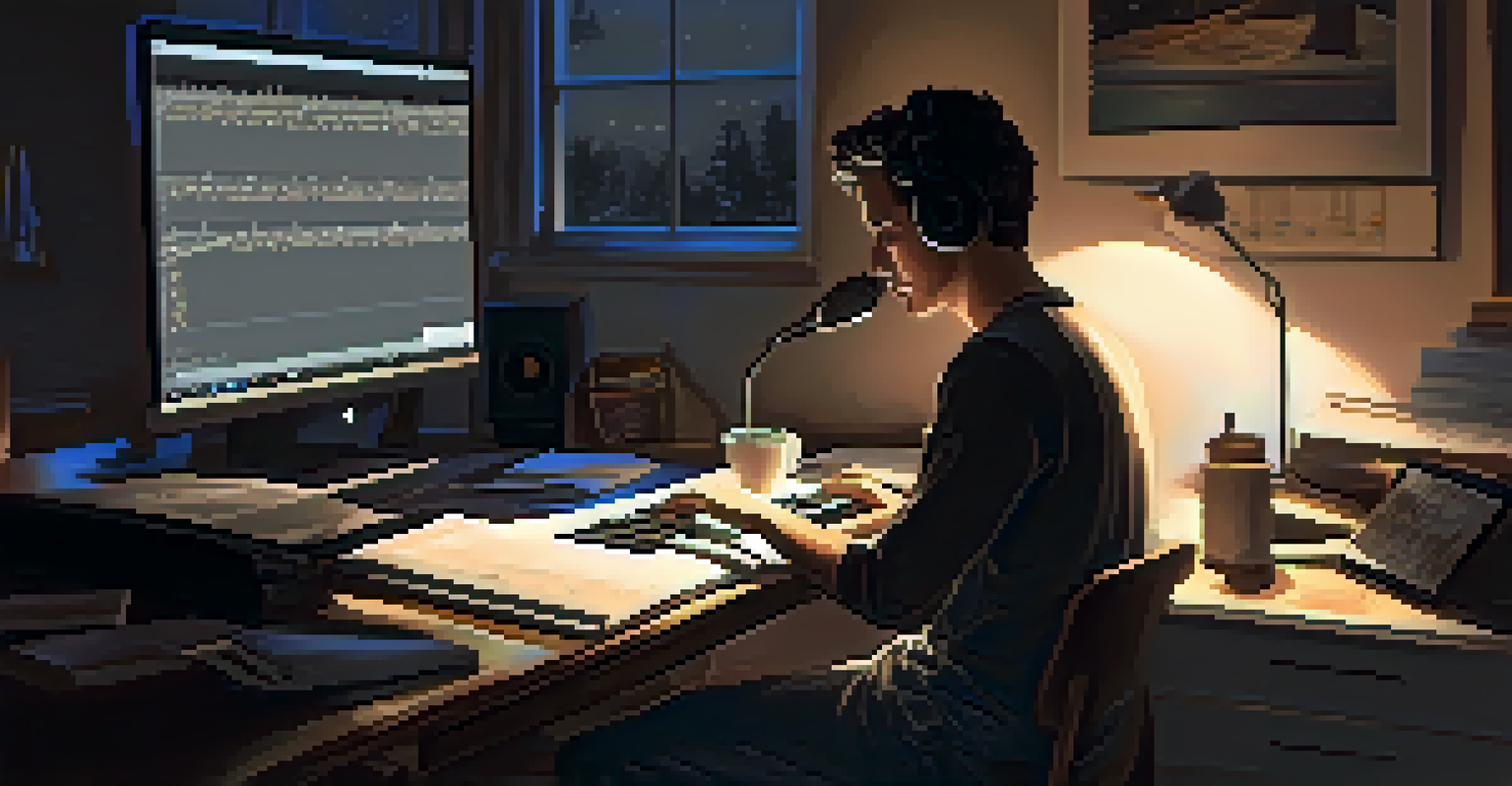The Role of Composers in Shaping Film Narratives and Emotions

Understanding the Composer's Role in Film
Composers are the unsung heroes of filmmaking, crafting the musical score that enhances the entire cinematic experience. Their job goes beyond merely creating background music; they weave emotional layers into the narrative. Think of a composer as a storyteller who uses melodies instead of words, guiding the audience through the film's emotional landscape.
Music can change the world because it can change people.
In many ways, a film without a score is like a book without illustrations— it may tell a story, but it lacks the depth and emotional resonance that music provides. Composers collaborate closely with directors to understand the vision behind the film, ensuring that their music aligns perfectly with the intended mood and themes. This collaboration is essential, as the right score can elevate a scene from ordinary to unforgettable.
For instance, consider John Williams’ iconic score for 'Star Wars.' The themes he created not only define the characters and their journeys but also evoke specific feelings in the audience, from excitement to nostalgia. Such powerful compositions illustrate how integral a composer’s work is to the storytelling process.
Music as an Emotional Catalyst
Music has a unique ability to evoke emotions, often more effectively than dialogue or visuals alone. In film, composers harness this power to amplify the emotional weight of a scene. A well-timed crescendo can heighten tension, while a soft melody can bring tears to the eyes, making the viewer feel deeply connected to the characters' experiences.

For example, think about the heart-wrenching score in 'Schindler’s List' by John Williams. The haunting violin captures the sorrow and tragedy of the story, allowing the audience to truly feel the weight of the historical events portrayed. This emotional engagement is crucial, as it fosters a deeper connection to the narrative and its characters.
Composers Enhance Emotional Depth
Film composers use music to weave emotional layers into the narrative, guiding audiences through the story's highs and lows.
Moreover, composers often use motifs—short, recurring musical phrases—to represent specific characters or themes, further enhancing emotional resonance. These motifs can trigger memories of pivotal moments in the film, creating a richer viewing experience and allowing the audience to relive those emotions with each recurrence.
Building Tension and Suspense Through Music
One of the most powerful tools in a composer’s arsenal is the ability to build tension and suspense through music. The right score can keep audiences on the edge of their seats, heightening anticipation for what's to come. Just think of the chilling score in horror films; it often includes dissonant chords that create an unsettling atmosphere, making viewers anxious and alert.
The music is the emotional core of the film. It has to be a character in the story, not just a backdrop.
Take, for instance, the music in Alfred Hitchcock’s 'Psycho.' The infamous shower scene is propelled by the sharp, staccato strings that mimic the tension of the moment, leaving audiences breathless. This clever use of music not only enhances the visual horror but also embeds a sense of fear in the viewers' minds long after the film ends.
By manipulating tempo, volume, and instrumentation, composers can expertly guide the audience's emotional response, ensuring that they feel every twist and turn of the narrative. This skillful orchestration of tension is a hallmark of great film scoring.
Creating Atmosphere and Setting the Scene
Beyond just evoking emotions, composers play a vital role in establishing the atmosphere of a film. The score can transport viewers to different times and places, enriching the storytelling with cultural and historical context. For instance, a sweeping orchestral score can evoke a sense of grandeur, while a minimalist piano piece might convey intimacy and vulnerability.
In films like 'Gladiator,' Hans Zimmer’s epic compositions create a sense of vastness and adventure, immersing audiences in the ancient world. The music acts as a backdrop that enhances the visuals, allowing viewers to feel as if they are part of the story rather than just observers.
Music Builds Tension and Atmosphere
Through careful manipulation of musical elements, composers create suspense and establish the film's atmosphere, immersing viewers in the experience.
Additionally, the choice of instruments and styles can reflect the film’s setting, helping to ground the narrative in its geographical and cultural context. This seamless integration of music into the film's atmosphere is what makes the viewing experience truly immersive.
Character Development Through Musical Themes
Composers often use distinct musical themes to represent individual characters, enriching their development throughout the film. These themes can evolve alongside the characters, reflecting their growth or change. For example, a character’s theme might start off simple and become more complex as they undergo personal transformations, mirroring their emotional journey.
In 'The Lion King,' Hans Zimmer and Elton John crafted memorable melodies that align closely with the characters’ arcs. Simba’s theme, for instance, grows more powerful as he embraces his identity and responsibilities, allowing the audience to feel his triumphs and struggles.
By associating specific musical motifs with characters, composers enhance the audience's understanding of their personalities and conflicts. This technique creates a deeper emotional connection, as viewers come to recognize and anticipate these themes throughout the film.
The Impact of Silence in Film Scoring
While music often takes center stage in film scoring, silence can be just as impactful. Strategic use of silence can create moments of reflection, tension, or shock, allowing the audience to process what they have just witnessed. Silence can serve as a powerful tool to accentuate the emotional weight of a scene, often making the subsequent music feel even more profound.
Consider the use of silence in 'A Quiet Place,' where the absence of sound heightens the suspense and fear of the characters’ predicament. The moments of silence force viewers to hold their breath, fully engaged and anxious about what might happen next.
Collaboration Shapes Film Scoring
The partnership between composers and directors is vital, as it ensures the music aligns with the film’s vision and emotional journey.
By carefully balancing music and silence, composers can control the pacing and emotional flow of the film, ensuring that audiences remain captivated and attentive. This nuanced approach to scoring is what distinguishes great film composers from the rest.
Collaborative Efforts: Composers and Directors
The collaboration between composers and directors is crucial in shaping the final sound of a film. Directors often have a specific vision for how they want the music to enhance the story, and composers work closely with them to realize that vision. This partnership is built on open communication, where ideas flow freely, allowing for creative experimentation.
For example, the collaboration between director Christopher Nolan and composer Hans Zimmer has resulted in some of the most memorable scores in recent cinema, including 'Inception' and 'Dunkirk.' Their synergy demonstrates how a strong partnership can lead to innovative and impactful musical storytelling.

Ultimately, this collaboration is about more than just music; it's about creating an emotional journey that resonates with the audience long after the credits roll. The combined efforts of directors and composers truly shape the film's narrative and emotional depth.